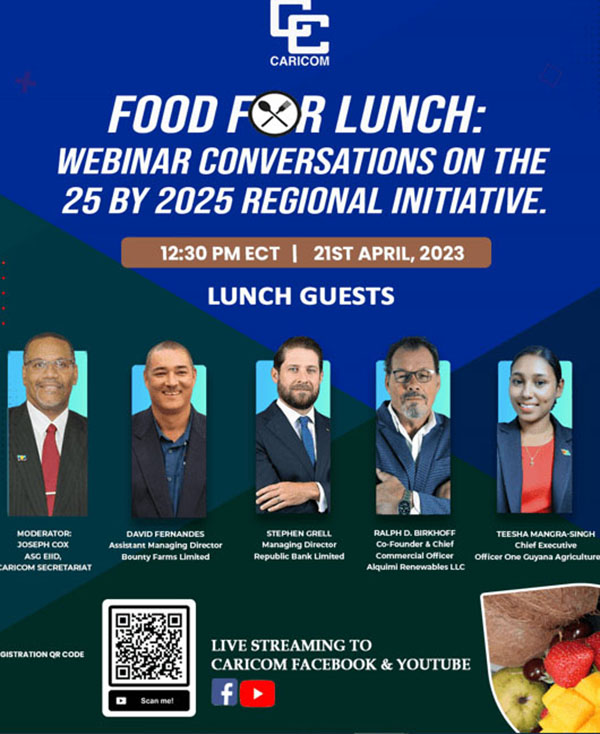The Caribbean Community (CARICOM) on Friday April 21 launched a series of webinar conversations designed to focus attention on what has become the high-profile issue of the urgent shoring up of the region’s food security credentials. With updates on key Caribbean food security issues having been few and far between since the disclosures several months ago on the launch of a regional food terminal and the region’s 25 x 2025 commitment, the Food For Lunch was expected to raise, once again the profile of the Caribbean’s food security status even as international agencies continue to sound ominous warnings about what they say is a likely worsening global food security status quo.
Food for Lunch, the name given to the forum, holds a special significance for Guyana, which is being looked to as the ‘anchor’ for the wider regional initiative to shore up the region’s food security bona fides in the period ahead. The panel for last Friday’s inaugural Food For Lunch webinar conversation reflected a heavy private sector bias that included local supermarket Chain, Bounty Farms Assistant Managing Director, David Fernandes; Managing Director of Republic Bank Ltd., Stephen Grell; Chief Commercial Officer, Alquimi Renewables LLC, Ralph Birkhoff and Teesha Mangra-Singh, Chief Executive Officer, One Guyana Agriculture Inc. What observers around the region would have been concerned about, however, is the extent to which the Food for Lunch exercises did inject a further sense of urgency into the region’s focus on shoring up its food security bona fides or whether the forum simply metamorphosed in ‘Talk Shops’ that did little to enhance the sense of urgency associated with regional food security.
Guyana’s President Irfaan Ali and Barbados Prime Minister Mia Mottley share the lead responsibility for taking the regional food security drive forward, the agreement that the two countries will spearhead the establishment of a Regional Food Security Terminal being the high point of a flurry of regional food security-related legwork. Over the past two years, the issue of regional food security had gathered momentum in the face of the increasing focus by international organizations like the World Food Programme (WFP) and the Food and Agriculture Organization (FAO) on what became a dire food scarcity circumstance in other regions. In the past year, global focus on food security became more pronounced following Russia’s invasion of Ukraine and the knock-on effects on global food availability, driven largely by the war, impacted sharp reduction in Ukrainian grain to other countries, including countries in Africa and elsewhere facing serious food security challenges.
While the lunchtime Food for Lunch was described by the organizers as “one of the avenues being used to augment awareness of food insecurity in the Region and the 25×25 initiative”, the region, regrettably, has a poor track record for the filtering down information to the community level on issues critical to the development of the region and enticing the wider regional populations to play an active role in pursuit of key objectives. At a recent University of the West Indies forum hosted by the CARICOM Secretariat to mark CARICOM’s 50th Anniversary, the organization’s Secretary General, Dr. Carla Barnett, reportedly drew attention to the region’s food security strategy which she said focused on increasing productivity, spurring regional trade and investment in the agricultural sector, an evident attempt to raise awareness of the importance of food security on the region’s current list of priorities. Specifically, she addressed the issues of greater involvement of women and young people in the food security focus, not least the adopting of smart agriculture technologies, in order to realize sustainable production, in response to risks associated with climate change.











